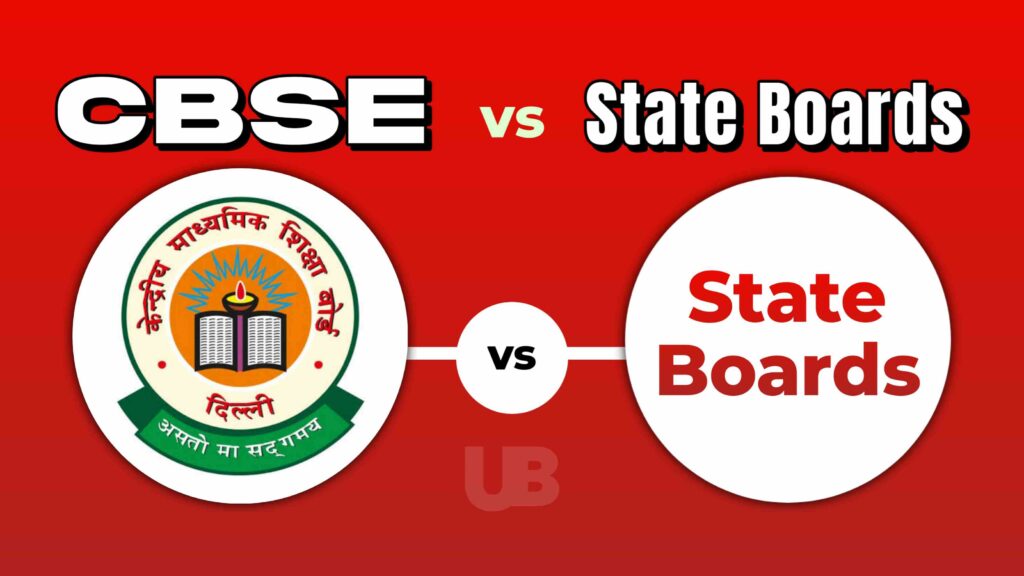
CBSE vs. State Board Exams
Choosing the right educational board is one of the most important decisions for students and parents in India. Two of the most prominent options are the Central Board of Secondary Education (CBSE) and various state boards. Each has its own set of features, advantages, and challenges. This blog aims to provide a detailed comparison of CBSE and state board exams, helping you make an informed choice for your academic future.
Table Of Contents
- 1 CBSE vs State Boards: Brief Overview
- 2 CBSE vs State Boards: Curriculum and Syllabus
- 3 CBSE vs State Boards: Examination Pattern
- 4 CBSE vs State Boards: Medium of Instruction
- 5 CBSE vs State Boards: Recognition and Acceptance
- 6 CBSE vs State Boards: Pros and Cons
- 7 Making the Choice for CBSE and State Boards
CBSE vs State Boards: Brief Overview
CBSE (Central Board of Secondary Education)
The CBSE is a national-level board of education in India, managed by the Union Government. It is known for its well-structured curriculum, standardized exam pattern, and widespread acceptance both within India and internationally.
State Boards
State boards are governed by the respective state governments. Each state has its own board, such as the Maharashtra State Board, Tamil Nadu State Board, and Jharkhand Academic Council, among others. The curriculum, exam pattern, and evaluation methods vary from one state to another.
CBSE vs State Boards: Curriculum and Syllabus
CBSE (Central Board of Secondary Education)
- Uniform Curriculum: The CBSE curriculum is uniform across all affiliated schools, ensuring consistency in educational standards.
- Conceptual Focus: The syllabus emphasizes conceptual understanding and practical application, especially in core subjects like Mathematics and Science.
- National Integration: CBSE promotes national integration with a common curriculum relevant across all regions of India.
State Boards
- Regional Relevance: The curriculum is designed to meet the specific educational needs of each state, often including local history, culture, and languages.
- Diverse Syllabus: The syllabus can vary significantly from state to state, reflecting different educational priorities and standards.
- Localized Content: Greater emphasis on regional topics and state-specific educational goals.
CBSE vs State Boards: Examination Pattern
CBSE (Central Board of Secondary Education)
- Mixed Question Types: CBSE exams include a mix of objective (multiple-choice questions) and subjective (short and long answer) questions.
- Continuous Assessment: The board follows a system of Continuous and Comprehensive Evaluation (CCE), assessing students through projects, assignments, and periodic tests.
- Standardized Exams: High standardization ensures uniformity in assessments across different regions.
State Boards
- Subjective Focus: State board exams often emphasize subjective questions, testing students’ descriptive and writing skills.
- Varied Evaluation Methods: Evaluation criteria and methods differ, with some boards incorporating periodic tests while others focus primarily on final exams.
- State-Specific Exams: Exams include content relevant to the state’s educational priorities and regional specifics.
CBSE vs State Boards: Medium of Instruction
CBSE (Central Board of Secondary Education)
- Bilingual Instruction: CBSE schools offer instruction in both English and Hindi, with a strong emphasis on English.
- Urban and Rural Reach: CBSE schools are prevalent in urban areas but are increasingly present in rural regions as well.
State Boards
- Regional Languages: Instruction is often in the state’s official language, with English as a secondary language.
- Wide Accessibility: State boards are more accessible to students in rural and semi-urban areas, providing education in the local language.
CBSE vs State Boards: Recognition and Acceptance
CBSE (Central Board of Secondary Education)
- Wide Recognition: CBSE is recognized nationwide and internationally, facilitating easier transfers between schools and pursuing higher education abroad.
- Competitive Exam Alignment: The CBSE syllabus aligns well with national competitive exams like JEE, NEET, and others.
State Boards
- State-Level Recognition: State board certifications are primarily recognized within the state, with varying levels of acceptance outside the state.
- Regional Competitive Exams: Syllabus tailored to state-level competitive exams and entrance tests.
CBSE vs State Boards: Pros and Cons
CBSE (Central Board of Secondary Education)
Pros:
- Uniform Curriculum: Ensures consistency in education across all affiliated schools.
- Conceptual Learning: Emphasis on understanding and applying concepts.
- Competitive Exam Preparation: Syllabus aligns with national-level competitive exams.
- Wide Acceptance: High recognition both nationally and internationally.
Cons:
- Lack of Regional Focus: May not cover regional topics in-depth.
- Transition Challenges: Students transitioning from state boards may find it challenging.
State Boards
Pros:
- Regional Focus: Curriculum tailored to regional needs and context.
- Local Language Instruction: More accessible to students in rural areas.
- State-Specific Content: Emphasis on local history, culture, and issues.
Cons:
- Variable Standards: Educational standards can vary widely between states.
- Limited Recognition: Certificates may have limited acceptance outside the state.
- Competitive Exam Alignment: May not align as well with national-level competitive exams.
Making the Choice for CBSE and State Boards
The choice between CBSE and state boards should be based on several factors, including:
- Educational Goals: Consider whether you aim for national-level competitive exams or prefer state-specific opportunities.
- Language Preference: If local language instruction is important, a state board might be more suitable.
- Mobility: If you anticipate moving between states or countries, CBSE’s uniform curriculum could be beneficial.
- Regional Relevance: If you want a curriculum that includes regional history, culture, and language, a state board is ideal.
Both CBSE and state boards have their unique strengths and cater to different educational needs. CBSE is ideal for students looking for a uniform curriculum and preparing for national competitive exams. State boards are suitable for those who prefer education in their regional language and a curriculum tailored to their state’s context.
Ultimately, the best choice depends on your specific needs, goals, and circumstances. By carefully considering these factors, you can make an informed decision that will support your academic success and future aspirations.






